The following first 7 days of a blackout scenario is loosely based on a real experience of a prolonged power outage. It happened at a time when supply chain issues and labor shortages made it hard for utility companies to restore the electrical grid.
The following journal entries and in-depth insights are meant to help you prepare and refine your strategy should you need to survive a 7-day blackout in your own life.
Day 1 of Blackout
The news report says the ice storm knocked out the eastern third of the city’s power grid, and it might take several days to fully restore power. Living at the end of the road by the wilderness park, I’m guessing we’ll be one of the last to get power back.
I don’t know how long we’ll have water pressure being at the end of the line. So, I filled the bathtub and every jug I’ve got. There should be enough water to manually flush the toilet and wash up for a few days.
A bunch of people ran out panic-buying. I stayed home and kept working on the house. I hope that doesn’t come back to bite me. The water pressure seemed to die in the late afternoon when all the neighbors got back from the stores.
I tried launching my phone as a hotspot and tethered it to my laptop, but there was no signal. I think the blackout is affecting the cell towers.
I pulled the flashlights and power station out of the camping gear. It’s still got 77% of the charge left. Thank God, I recharged it after our last trip!
Notes:
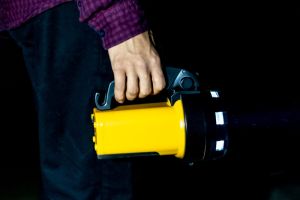 The lithium-ion batteries will lose 3 to 5% of charge per month.
The lithium-ion batteries will lose 3 to 5% of charge per month.
These batteries can be damaged if depleted of charge.
So, it’s always wise to fully charge your power station after every camping trip.
Related: DIY Off-Grid Battery Charger
If you have municipal water, there’s no telling how long water pressure will last. Keeping a dozen big water jugs on hand or filling the bathtub immediately ensures you have water for washing, drinking, and flushing the toilet.
Day 2 of Blackout
The refrigerator didn’t stay cold as long as I hoped. I moved what I could to the chest freezer, then we had a big cookout last night. Tried to keep the thawed meat from going to waste. Used the charcoal grill to save propane.
It got colder in the house than I expected. So, I moved everyone into the downstairs family room where we could all sleep in one room at the same time.
We tried the ceramic pot candle heater thing you see on the internet, but it didn’t do much. Hooked up the sunflower heater I use when ice fishing and it kept the living room warm enough.
I used the power station to run some lights and a fan for white noise last night. It was down to 48% this morning. I figured out how to connect it to the 100-watt solar panel but it’s only trickle charging.
Notes
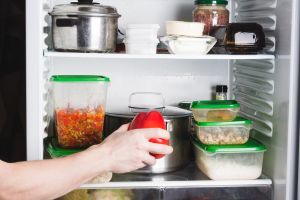 A refrigerator will only stay cold for 4 to 6 hours at best. A freezer might keep food cold for 24 to 36 hours. A strategically packed chest freezer can keep foods cold for up to 72 hours.
A refrigerator will only stay cold for 4 to 6 hours at best. A freezer might keep food cold for 24 to 36 hours. A strategically packed chest freezer can keep foods cold for up to 72 hours.
A 300-watt-hour (WH) power station can’t run big appliances for long. They’re meant more for running small lights and fans.
When using a propane heater indoors, make sure to place a CO detector nearby. Only use the heater in the coldest parts of the night.
Day 3 of Blackout
Figured out how to make coffee by boiling water on the old charcoal grill. Then I slowly poured it over the grounds in the coffee maker. Nice to get a little taste of my usual morning routine again and my headache finally went away!
The kids are getting cranky. I think the idea of camping at home isn’t fun for them anymore. They’ve been out of their comfort zone for too long. Rigging up the camping shower kit in the upstairs bathroom. I simmer water on the grill to give everyone a short shower.
I think I’ll hook the power station up to my old laptop so we can all watch a movie tonight.
Notes
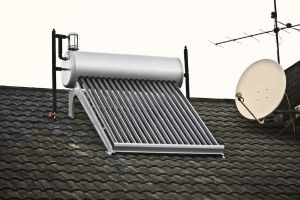 Morale can start to suffer after 3 days in a blackout. Recreating little creature comforts helps maintain a positive mindset. You can improvise a camping shower at home with a cheap solar shower to get everyone clean.
Morale can start to suffer after 3 days in a blackout. Recreating little creature comforts helps maintain a positive mindset. You can improvise a camping shower at home with a cheap solar shower to get everyone clean.
Related: How to Build an Endless Hot Water System (Without Electricity)
Playing a favorite family board game, or just sitting outside promotes family togetherness. It’s especially helpful for kids.
Day 4 of Blackout
The dog woke us up barking at something or someone in the middle of the night. I looked but didn’t see anything.
The news report said the utility company hopes to have power restored in a day or two.
It took around two hours to get it to 100%. We just need to be smart about how we use it going forward.
Notes
Looks like the neighbor got his hands on a big generator and is running in his garage. I traded him some toilet paper and a big, thawed ham to have him recharge the power station.
 By day 4 you and/or your neighbors are bound to run out of something.
By day 4 you and/or your neighbors are bound to run out of something.
It’s also the time when all the frozen food is thawed. It’s a great time to trade.
It can also be the point when unprepared and unsavory individuals look for looting opportunities.
Strengthening good relationships with your neighbors has definite security benefits as well.
Day 5 of Blackout
Getting the garage door open was a nightmare, but I needed the SUV to go look for supplies.
The stores were all out of big exchange tanks and U-Haul was out of propane. I found a four-pack of 1-pound propane cylinders at a truck stop. I think it will be enough to get us through the coldest part of the night.
I also found a 150-watt inverter that plugs into the SUV. Now we can recharge my laptop and all the other devices without having to use the power station! Why didn’t I think of this sooner?
Notes
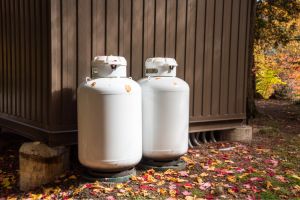 Propane supplies dwindle fast in a prolonged blackout. Truck stops are a great place for convenience supplies that you might use for car camping. They’re not a place the average person thinks of going for things like propane and electric adapters. So, they’re worth checking out after the big box store’s shelves are bare.
Propane supplies dwindle fast in a prolonged blackout. Truck stops are a great place for convenience supplies that you might use for car camping. They’re not a place the average person thinks of going for things like propane and electric adapters. So, they’re worth checking out after the big box store’s shelves are bare.
One-pound gas cylinders might be easier to find and hold around 21,000 BTUs. This is enough to run a Sunflower heater for roughly 4 hours.
Day 6 of Blackout
The rainstorm last night filled the rain barrels for the garden to the brim. It’s not drinkable but lets us flush the toilet and shower.
We grilled up the salvageable from the freezer. The dog gets to eat the rest.
The internet came back for a few hours in the middle of the day but went down again with no signal.
We made tuna mac and cheese on the grill, and a three-bean salad using canned beans that turned out great.
Related: I Tried to Eat My Emergency Foods and This Is What Happened
Charging my laptop from the SUV has been a real godsend. Reduces the drain on the power station and lets us have a family movie night.
Notes
Time and a positive mindset will help you adapt easily to any survival situation.

You start to find new ways to make the most out of resources you previously took for granted.
By day 6 of a power blackout fresh meat and dairy are completely gone or spoiled. Canned meats like tuna and SPAM are good options protein options.
Day 7 of Blackout
The lights and everything blinked on for a few seconds this morning. The whole house started beeping and dinging but went black again.
Some of the circuit breakers in the panel were flipped. I don’t know if they were always like that.
I reset all the circuit breakers and turned off everything. Unplugged the refrigerator and the TV and left just the bathroom light on.
The power finally came back on at 5:30 and stayed on. None of the circuit breakers tripped. I think we’re finally out of the darkness, but the stores are still pretty much empty.
Notes
Power surges are common after a 7-day blackout there are often power surges. The grid can flicker and fail again when so many devices suddenly come back on again.
Ideally, you should unplug sensitive electronics like TVs, desktop computers, and refrigerators at the start of a blackout to prevent surge damage.
Even once power is restored, be prepared for it to take several days to weeks before the shelves of local stores are restocked.
Surviving the first 7 days of a blackout starts with using your resources wisely. Maintaining a positive, growth mindset is also crucial. Reinventing creature comforts and maintaining social connections within your family and neighbors also boost morale.
Your resources are going to change over time. Perishable foods have a finite lifespan. You’ll need to eat them in the first few days or trade them to the neighbors for other important supplies.
If you need to resupply, mom-and-pop hardware stores and truck stops are more likely to have supplies in reserve after big box stores are picked clean.
When the 7-day blackout finally ends, there are likely to be power surges. Unplugging sensitive appliances like refrigerators, and TVs can protect them from surge damage.
You may also like:
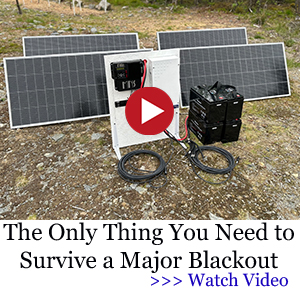 Best U.S. States to Forage for Food
Best U.S. States to Forage for Food
How to Avoid Being Targeted by Looters During a Massive Blackout (Video)
Are You Prepared for the Biggest Social Unrest of Our Modern Times?
Bartering Items You Need to Stockpile for the Next Financial Crash















we went 11 days without power in the 2007 ice storm. things we did to make life bearable were, use 6 gal trashbags in the toilet after dipping out all the water. if we’d urinate we left it but if we pooped we tied it up and put it in a black trash bag where it froze immediately. i unhooked the washer hoses in the lower portion of the house and went to an upper bathroom and unhooked the sink lines and blew out the hot and cold lines. each one yielded about 5 gallons of water, and kept the lines from freezing. i put a kerosene lantern in the well house to keep those pipes from freezing. we didn’t have a generator at that time but we have a dozen kerosene lanterns, one in each room so we didn’t have to waste flashlight batteries. i keep several gallons of kerosene on hand. we have a wood stove we got for such emergencies. board games kept us sane in the evenings. we always keep 30 gallons of water on hand and switch it out every 6 months. as far as the freezers we got dry ice from the store and 2 applications lasted the 11 days so we didn’t have to home can any of the meat. lets hope we don’t have any power outages but if we do i hope some of this info is helpful.
Ain’t worried if anything happens, God is still in charge whether you are a prepper or a normal person, faith has a lot to do with our daily lives.
We don’t need to bible thump the verses to prove our loyalty to God and Jesus Christ, some people do take it to the extremes. Wear their religion on their shirt sleeves.
It does not hurt to practice a few basic skills and a little camping to keep it touch with mother nature.
It is the influx of the Demoncrat armed gangs is what will plague us for years on end, if socialist Harris and Walz become the next puppets of Obama and George Soros. Bill Gates has bought up tone of farmland.
I like the idea of China selling back all the farmland back to America for the original cost they paid and leave America.
God bless the voters to make the right choice 11-05-2024.
After the last full day blackout my propane tank was not down enough for the gas man to add any. He says that the generator we have 24kw with a 500 gallon propane tank should last a week. We’re on well water so as long as the generator runs we have water.
Does anyone have experience with Satellite internet, does it stay up during extensive blackouts?
Finally, a useful and well written article.
Great article. 6 days is our longest after an ice storm. Thankfully we have a wood stove and our little farm has county water. I turn off electrical panels right away. I can see a couple houses from our place so I wait until I see their lights on before I flip my electric service back on so we don’t get the power bumps. After longer outages, I only turn my septic pump on for 10 or 15 minutes at a time so I don’t overload my drain field. After half a day or so, I leave the pump on to do It’s normal cycling.
When my kids were younger, they enjoyed the camping in the house and cooking on the wood stove.
We were without electric for 17 days.
I have a gas stove. That was very helpful. I canned the food in my fridge and anything that started to thaw in my freezer. We had a kerosene heater for backup. Now we have a none vented gas heater works great. I have 30 gallon tote full of candles and battery operated laterns and flashlights. I also keep 40-50 batteries in my supply that gets rotated (I have kids that go through a lot of batteries).
My experience with a 7 day black out near Seattle….12″ of snow drops knocking tree limbs on all the power lines ….then sun comes out but temperature drops below freezing and windy…..for a week… My poor tropical fish were jumping out of the tank to get away from the rapidly cooling water. My cat fish survived…i still have it…Had power at work so it was not to bad.Still did not feel like bugging out into the snow.
I have been in a couple local blackouts, though nothing as severe as a seven day blackout. I had both solar and propane-powered gennys to use. Of course I wasn’t hooked up to “the grid”, either. Everyone else was without power.
Well think about it…..the satellite constellation is completely self powered. So they will keep working. But if you don’t have a source of power for your satellite receiver, you won’t be able to keep it working. A whole house, auto start, auto transfer generator is a good thing to have. It is probably too big and heavy for the average gangster to carry off. But you also need a big (full) tank of propane or a connection to a natural gas supply. A 1000 gallon propane tank will only get filled to 80% because it needs room for expansion. So I bought two 1000 gallon tanks, thus allowing me to keep 1600 gallons which should get us through most extended power outages. I am also considering the installation of a solar system with battery back up. Then I will really have all of my bases covered.
Y wife ad I survived 12 day blackout when back to back ice storms hit our area in Southern Maryland. We live on a dead end road that usually stays out of power for long periods when power goes down due to being at the end of the system. We also had 10 kids ( my 4, my brothers 4, and 2 foster kids) plus 6 horses and 10 goats. We have well water and septic system 4 of the kids were asthmatic, so wood burning was out of the question and our house is all electric. We have two large kerosene heaters and several kerosene lanterns for emergencies and I keep a 55 gallon drum of kerosene with a hand pump. Here’s a stream at the bottom of our property that we upped water from with buckets into a water trough on a cart hooked behind the tractor to water the animals and use for washing and wast water. I had a generator that hooked to the pto on the tractor and back fed through the dryer plug into the house, but was only enough to run few outlets like for the refrigerator and some lights, or the well pump at a time. We have heat pump that I didn’t want to run or the electronics due to not trusting the generator. The kids got so used to playing cards an board games and doing chores that when the lights came back on, they would still spend time each night doing tournaments. They all now have kids of their own and tell them the stories of that time, sounding like my grandparents stories if the Great Depression.
Buy solar and wind turbine as well as rechargable batteries, a lot of them. As long as there is light or wind you will be ok. You can trade electricity too. Having your own well is a blessing. You can trade water as well.
Most people, whether prepper or not, should be able to handle a week without power without much difficulty. It’s when the power’s out for a month or more that things can get dicey The food thawing out in the fridges and freezers will be the biggest problem. Will also make a difference where you live and what time of year it happens. If it’s the middle of winter and you’re dealing with minus 30 degrees temps you have a much bigger problem on your hands. As a side note IF it’s the middle of winter when it happens and you’re having to deal with very cold temps just open your freezer lid to keep the food cold. Just make sure that your freezer is secure so that no critter or human can get at your food. If you think the power’s going to be out for a day or more first thing fill up your bathtub and any container you can get your hands on with water. And then if it’s really cold remember to drain all the water pipes in your house. A week without power is a cakewalk. I remember the big NE power outage of 2003. We were without power for 3 days but it wasn’t a big deal because it was the middle of summer. It was like an unexpected 3 day holiday. No one around me panicked. Could have been much different if it would have happened in the middle of winter where nighttime temps are regularly minus 30 or more. Don’t know how many people would have remembered to drain their water pipes.
With a proper inverter connected to your vehicle, you can run refrigerators and freezers for a few hours at a time. That’s enough to keep them cold. They don’t run constantly. Ditto for the water pump. Just rotate what you’re powering the high-needs items. We have a generator, and it’s got us through many, many power outages. We only run it for a few hours at a time, not 24/7. Longest outage was 10 days with elementary school aged kids. Never lost any food. Car + inverter is a backup.
Any tips for the desert in summer?